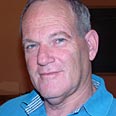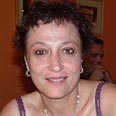

Saving Israeli druggies in India
Yochai and Kochi Am-Ad established two hospices in India for the treatment of Israeli backpackers who have gone through extreme drug-related experiences. ‘The men become violent, while the women mainly want to sleep with everyone,’ they say. Israel Anti-Drug Authority Director General says Israeli authorities decided to launch project also out of fear youngsters recently discharged from IDF would leak sensitive security-related information due to drug use
“We run into cases of extreme violence; young people who walk on the road and stop cars because they believe that if they touch the car they will fly. They have a deranged look in their eyes – they walk around half-naked, sleep-deprived; they develop an imaginary reality for themselves, and are unable to carry out basic acts such as eating , getting dressed and showering”
Yochai Am-Ad is not trying to sugarcoat anything when he speaks of Israeli backpackers in India who have deteriorated to hard drugs.
Am-Ad and his wife Kochi were sent to India a year-and-a-half ago following the government’s decision to assist Israelis who have gone through extreme drug-related experiences there.
_O&91;1&93;_wa.jpg)
Hospice in India (Photo: Eitan Gorni)
The couple established two hospices in Goa and Manali, both popular destinations for Israeli travelers in India.
“We decided to set up a hospice that would be completely drug-free,” Kochi says.
The hospices contain a Hebrew library and offer Israeli movies and an array of activities characteristic of Israeli culture.
‘They just dropped her there and left’
The hospices are operated in cooperation with the Association for the War on Drugs and Kfar Izun (Village of Balance), which was established in 2001 to provide a new therapeutic approach to young Israelis suffering from mental imbalance due to hallucinogenic or mind-altering drugs.
Backpackers began to flock to the hospices a few months after their establishment.
“There was one case in which we found a young Israeli woman lying in the entrance to one of the hospices,” Yochai says.
“Her friends brought her in the middle of the night after she was feeling very ill. They just left here and left.”
According to the couple, the drugs influence female and male travelers differently.
“The men become violent, while the women mainly want to sleep with everyone,” Kochi explains.
“In many cases they say aliens are contacting them and telling them what to do. Sometimes they just can’t stop crying for 12 consecutive hours.”
_o&91;1&93;_wa.jpg)
'We decided to set up a hospice that would be completely drug-free' (Photo: Eitan Gorni)
Israel is the only country that treats drug-afflicted citizens abroad. Why? Kochi has a simple explanation: “All Israelis look out for one another. We are the only nation that has survived for 2,000 years, and I suppose that is why we are here.”
During the first nine months of their stay, Kochi and Yochai treated 36 Israelis who underwent severe drug-related experiences.
One patient, a 27-year-old woman who was visiting India for the first time, fell during a trek in the mountains and suffered a blow to her ribs.
“Someone gave me opium; I had no idea what it was,” the woman recounts.
“I treated it as a pain-killer and got hooked. I didn’t eat; I lost my sense of time. Kochi and Yochai were there for me. They contacted my parents and organized my return to Israel. Their work proves that the country cares. It’s a shame though that I did not get to finish the trip as I had planned.”
‘We’re afraid drug users may leak security-related information’
Kochi and Yochai say the backpackers’ parents have a lot to do with the phenomenon.
“Their reactions contribute to this. Many youngsters say they have no real dialogue with their parents,” Yochai says.
“Israeli parents are fearful of placing boundaries and confronting their children, and even though they are aware the children are doing drugs, their response is ‘it’s a natural part of rebellion.’”
The couple says the Indian authorities are also pleased with the Israeli initiative.
“The Indian parliament’s representative in the Goa region told us we should be up for a Nobel Prize because we are successful in restraining the Israeli (backpackers),” Kochi says.
Israel Anti-Drug Authority Director General Haim Messing told Ynet that Israel decided to launch the project as “officials from the Israeli embassy in New Delhi presented a situation whereby the number of cases in which it was necessary to offer initial treatment for drug victims reached monstrous proportions.”
“We found that most of the Israelis there – about 20,000 – use drugs on a daily basis,” Messing said.
“It turned out that youngsters who are physically harmed as a result of drug use do not receive proper initial care from the Indian authorities. We were also fearful that youngsters recently discharged from the army would leak sensitive security-related information as a result of their drug use.
“Lastly, we noticed that these youngsters simply become detached from Israel and lose their identities. I can say that during the past year 40 families have owed their children’s’ lives to this project.”















